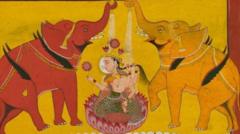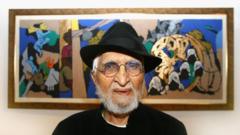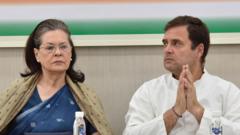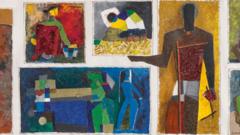A court in Delhi has ordered the seizure of two paintings by renowned artist MF Husain, following a complaint that they "hurt religious sentiments." The move amplifies ongoing tensions regarding artistic expression and its clash with religious beliefs in India.
Court Orders Seizure of 'Offensive' MF Husain Artworks Amid Rising Tensions in India
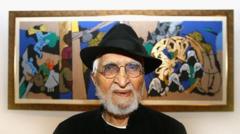
Court Orders Seizure of 'Offensive' MF Husain Artworks Amid Rising Tensions in India
Delhi court's decision to seize controversial MF Husain paintings reignites debate over artistic freedom vs. religious sentiments.
In a significant legal development, a Delhi court has authorized the police to confiscate two paintings by the late MF Husain, an emblematic figure in Indian art, following a complaint that the artwork is "offensive." The controversial paintings, displayed at an ongoing exhibition titled Husain: The Timeless Modernist at the Delhi Art Gallery (DAG), allegedly depict Hindu deities in a manner that hurts religious sentiments, according to the complainant, Amita Sachdeva.
Husain, who passed away in 2011 at the age of 95, has been synonymous with contentious art, often igniting outrage over his portrayals of Hindu gods, notably featuring nudity. The DAG has stated that they are not a participant in the legal proceedings and is currently seeking counsel regarding the situation.
The controversy began when Sachdeva, a lawyer, reportedly photographed the paintings during her visit to the gallery and subsequently filed a police report citing past complaints against the artist. She claims that by the time an investigating officer visited the gallery, the artworks in question had already been removed, and gallery officials denied their exhibition. Furthermore, Sachdeva has since petitioned the court to secure CCTV footage from the gallery period, asserting that it would corroborate her account.
On December 4, a judge at Delhi's Patiala House Courts noted that police had accessed the requested footage, and a report was filed revealing the exhibition's private nature aimed solely at showcasing Husain's originals. The art community is closely monitoring the developments, as DAG stated they are "reviewing the situation."
Maqbool Fida Husain, celebrated as the "Picasso of India," is renowned for his provocative works, which have historically drawn backlash, especially from hardline Hindu groups, accusing him of obscenity. Fear of backlash led him to flee India in 2006 following public outcry over his painting Mother India, which portrayed a nude woman as the Indian subcontinent.
In previous landmark rulings, India's Supreme Court dismissed attempts to file criminal charges against Husain, defending his art as a representation of India's rich cultural tapestry. The court's decision to shield artistic expression from allegations of obscenity ignited ongoing discussions on the limits of art in modern India, particularly as public sentiments shift towards conservatism.
In recent months, cases against other artists like FN Souza and Akbar Padamsee have further highlighted the complexities surrounding artistic liberties, with the Bombay High Court ruling against the seizure of artworks deemed merely "obscene." The growing tension between artistic expression and religious sensitivities continues to raise critical questions about democracy and the role of art in Indian society.
Husain, who passed away in 2011 at the age of 95, has been synonymous with contentious art, often igniting outrage over his portrayals of Hindu gods, notably featuring nudity. The DAG has stated that they are not a participant in the legal proceedings and is currently seeking counsel regarding the situation.
The controversy began when Sachdeva, a lawyer, reportedly photographed the paintings during her visit to the gallery and subsequently filed a police report citing past complaints against the artist. She claims that by the time an investigating officer visited the gallery, the artworks in question had already been removed, and gallery officials denied their exhibition. Furthermore, Sachdeva has since petitioned the court to secure CCTV footage from the gallery period, asserting that it would corroborate her account.
On December 4, a judge at Delhi's Patiala House Courts noted that police had accessed the requested footage, and a report was filed revealing the exhibition's private nature aimed solely at showcasing Husain's originals. The art community is closely monitoring the developments, as DAG stated they are "reviewing the situation."
Maqbool Fida Husain, celebrated as the "Picasso of India," is renowned for his provocative works, which have historically drawn backlash, especially from hardline Hindu groups, accusing him of obscenity. Fear of backlash led him to flee India in 2006 following public outcry over his painting Mother India, which portrayed a nude woman as the Indian subcontinent.
In previous landmark rulings, India's Supreme Court dismissed attempts to file criminal charges against Husain, defending his art as a representation of India's rich cultural tapestry. The court's decision to shield artistic expression from allegations of obscenity ignited ongoing discussions on the limits of art in modern India, particularly as public sentiments shift towards conservatism.
In recent months, cases against other artists like FN Souza and Akbar Padamsee have further highlighted the complexities surrounding artistic liberties, with the Bombay High Court ruling against the seizure of artworks deemed merely "obscene." The growing tension between artistic expression and religious sensitivities continues to raise critical questions about democracy and the role of art in Indian society.



